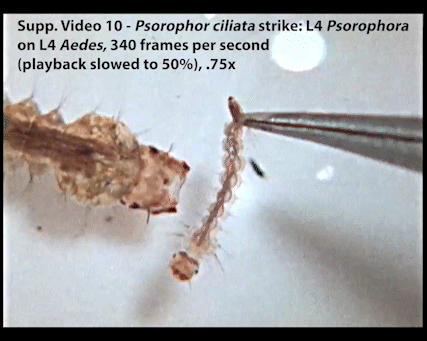Hunting
Cheetahs Become More Nocturnal in Extreme Heat, Study Finds
Hunting later at night may force the big cats to surrender their prey to larger carnivores, such as lions and leopards
Neanderthals May Have Hunted Cave Lions
Researchers say well-preserved bones may be the earliest direct evidence of the hunting of large predators
Stone Age Engravings of Animal Tracks Reveal New Details in Namibia
Indigenous tracking experts determined the species, sex, age group and leg of depicted animals in hundreds of carvings of footprints
These Long, Skinny Fish Hide Behind Bigger Fish to Sneak Up on Their Prey
Scientists made 3D-printed models of fish and tested them in the ocean to study this clever hunting strategy
Remains of Chihuahua-Sized Dog Unearthed at Roman Britain Villa
The tiny pup was likely a beloved pet, not an animal bred for hunting or herding
Giant Hand Axes Discovered in England Point to Prehistoric Humans' 'Strength and Skill'
A trove of artifacts found in a valley in Kent includes the third largest hand ax found in the country to date
Humans Take Out More Wild Species Than Any Other Predator on Earth
We kill, collect or otherwise use about 15,000 vertebrate species
Archaeologists Discover 25 Mesolithic Pits in England
The 8,000-year-old pits shed light on a period in Britain that historians know very little about
Early Women Were Hunters, Not Just Gatherers, Study Suggests
Regardless of maternal status, women hunted in almost 80 percent of recent and present-day foraging societies in a new study
These 12,000-Year-Old Flutes Mimic the Sound of Prehistoric Birds
The remnants of seven small bird bone instruments were discovered in northern Israel
Why Nature-Based Therapy Is Gaining Traction Among Veterans
Spending time outdoors can reduce symptoms of depression and PTSD—growing concerns among service members
Controversial Yellowstone Hunt Kills More Than 1,100 Bison
The hunt is an effort to control the animal's population and protect cattle outside the park
Did Our Ancestors Actually Wield Clubs?
Inspired by pop culture depictions of cavepeople, an archaeologist searches for what is real and what is a myth
Neanderthals Dined on Crab 90,000 Years Ago
Pieces of shells in a Portuguese cave suggest the early humans cooked and ate crustaceans, according to a new study
Neanderthals Hunted and Butchered Massive Elephants 125,000 Years Ago
Meat from the gigantic animals could have fed hundreds of hominids, according to a new analysis of bones found in central Germany
Is It Ethical to Hunt Captive Lions?
In South Africa, the big cats are raised to be killed by hunters. Opponents are outraged, but advocates point to conservation benefits
Neanderthals Cooked Surprisingly Complex Meals
Charred food remnants provide insight into 70,000-year-old dietary practices
Florida Teen Wins $10,000 for Hunting Invasive Pythons
The annual Florida Python Challenge combats the destructive snakes, which have taken over the Everglades
Mosquito Larvae Launch Their Heads to Capture Prey
Advances in technology allowed researchers to film these cannibalistic insects hunting for the first time
How Bird Collecting Evolved Into Bird-Watching
In the early 1900s, newfound empathy for avian creatures helped wildlife observation displace dispassionate killing
Page 1 of 7
:focal(1004x751:1005x752)/https://tf-cmsv2-smithsonianmag-media.s3.amazonaws.com/filer_public/15/c7/15c750bd-6553-474d-b50a-729d5a0486c8/33548972384_ba0366f94e_k.jpg)
:focal(682x513:683x514)/https://tf-cmsv2-smithsonianmag-media.s3.amazonaws.com/filer_public/bb/f7/bbf7901c-64e2-4bce-822b-3dff225631b0/23-10-12_pm_cavelion_fig2_minkus_nldk_web.jpg)
:focal(750x564:751x565)/https://tf-cmsv2-smithsonianmag-media.s3.amazonaws.com/filer_public/ce/28/ce281ca7-53c1-47cc-b3f4-4337116ab07b/journalpone0289560g004.png)
:focal(2600x1758:2601x1759)/https://tf-cmsv2-smithsonianmag-media.s3.amazonaws.com/filer_public/19/bd/19bd7deb-c0aa-44b1-8e5f-9386d717d8e6/gettyimages-146140976.jpg)
:focal(700x527:701x528)/https://tf-cmsv2-smithsonianmag-media.s3.amazonaws.com/filer_public/22/c4/22c4bc1f-7d49-40b7-bf71-6a8eb8a87f4b/dachshuaua.jpg)
:focal(600x451:601x452)/https://tf-cmsv2-smithsonianmag-media.s3.amazonaws.com/filer_public/91/73/91733178-e89d-4704-958f-9e28163ff987/measuring_the_ax.jpeg)
:focal(800x602:801x603)/https://tf-cmsv2-smithsonianmag-media.s3.amazonaws.com/filer_public/d3/f7/d3f797b9-fa38-493a-964f-52b9ae7ed1d3/header-uncropped_web.jpg)
:focal(400x190:401x191)/https://tf-cmsv2-smithsonianmag-media.s3.amazonaws.com/filer_public/df/2a/df2afadd-cf99-4a46-805f-6d90a5153882/pits_alignment.jpg)
:focal(1061x707:1062x708)/https://tf-cmsv2-smithsonianmag-media.s3.amazonaws.com/filer_public/d0/b5/d0b5b51b-8cea-4109-9236-b863913ca08e/gettyimages-681901635.jpg)
:focal(1393x1287:1394x1288)/https://tf-cmsv2-smithsonianmag-media.s3.amazonaws.com/filer_public/f0/93/f0933c1d-d5b4-47db-811a-2a11ab33e6f2/dsc0646.jpg)
:focal(800x602:801x603)/https://tf-cmsv2-smithsonianmag-media.s3.amazonaws.com/filer_public/66/4c/664cb755-cd3c-45a5-befe-2172c7772332/dsc07312_web.jpg)
:focal(1108x686:1109x687)/https://tf-cmsv2-smithsonianmag-media.s3.amazonaws.com/filer_public/b6/15/b61535bf-5962-47ec-ac14-e099d50e5a1b/gettyimages-1210318601.jpg)
:focal(800x602:801x603)/https://tf-cmsv2-smithsonianmag-media.s3.amazonaws.com/filer_public/05/50/05506e10-3ef9-4f11-b848-c9783efe744b/5552239606_e6c9316b1e_o_web.jpg)
:focal(2341x1560:2342x1561)/https://tf-cmsv2-smithsonianmag-media.s3.amazonaws.com/filer_public/d7/22/d7228295-6906-473a-b4bf-b23c734c1d34/pixnio-276234-4681x3100.jpg)
:focal(693x521:694x522)/https://tf-cmsv2-smithsonianmag-media.s3.amazonaws.com/filer_public/9f/e9/9fe968d0-f7e8-4fbb-934f-d90d7fd3b7c0/07_iaw_europ_waldelefant_fersenbein_schnittspuren.jpeg)
:focal(2518x1894:2519x1895)/https://tf-cmsv2-smithsonianmag-media.s3.amazonaws.com/filer_public/95/a8/95a81b5d-5248-4c8d-883a-5b5fb2dbd566/opener_-_janfeb2023_a17_lions.jpg)
:focal(512x346:513x347)/https://tf-cmsv2-smithsonianmag-media.s3.amazonaws.com/filer_public/15/84/1584e01d-d6f6-4cdc-9648-7215083e8546/shanidar-cave-1024x690.jpeg)
:focal(400x266:401x267)/https://tf-cmsv2-smithsonianmag-media.s3.amazonaws.com/filer_public/88/01/8801f1c3-f90f-45b1-b5e8-25e4bf2296c8/52149165195_0b8091bb1c_c.jpg)

:focal(700x527:701x528)/https://tf-cmsv2-smithsonianmag-media.s3.amazonaws.com/filer_public/e0/9b/e09b3e5d-30ca-424e-af75-668aa9a72ca8/birds-and-us4.jpg)